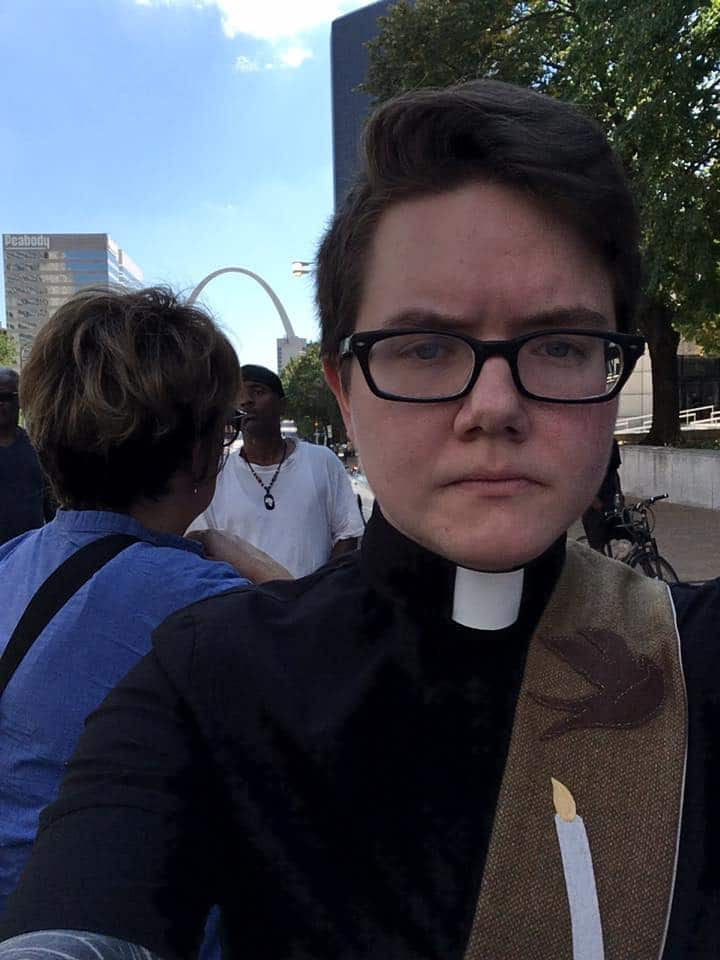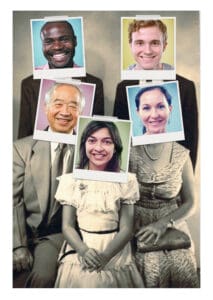
Editor’s Note: We are reprinting this essay, which first ran in 2019, because we feel it is helpful in the current cultural conversation.
The night before the verdict came down in the trial of Jason Stockley, I had a prophetic dream.
I had a dream that I was on the streets of Nashville, protesting as I had done dozens and dozens of times before. In college and divinity school, I protested for affordable housing, against the criminalization of homelessness, for reproductive rights, for LGBTQ acceptance and visibility, for Occupy Nashville, for Black Lives Matter. I protested so much that my voice got hoarse, my feet got weary, and I burned out. I stopped showing up, I stopped speaking out, and told myself someone else would do it.
In my dream, I was marching and crying. I was laying down in the road, “dying-in” on the interstates, crying in fear and fatigue. I did not want to be there. I was struck with fear that my body was in danger. I was tired of protesting and being a constant voice for social justice and change. But I was compelled by moral conviction to be present and to stand up.
Then, someone visited me in my dream. It was none other than a former professor of mine from Vanderbilt Divinity School, my social justice preaching professor, who had passed away a few months earlier. I remember him saying to me, somehow wordlessly, “Go. Do not shrink from your moral responsibility. Do not let fear hold you back from God’s call to justice.”
Do not let fear hold you back from God’s call to justice.
I woke up, feeling strangely emotional from the dream. I knew this was a dream that had to inform my actions in the following days. And this proved true, because just a few hours later I received the news that former St. Louis police officer Jason Stockley was deemed not guilty of murdering Anthony Lamar Smith.
Did I mention I had just moved to St. Louis two weeks earlier? I moved away from my hometown of Nashville, where the protests are neatly organized and orchestrated by seasoned activists and community organizers. In my experience, protests never turned violent, even when I was nonviolently arrested with Occupy Nashville. But I knew St. Louis could be a different ballgame, and that local activists and clergy had promised that if Stockley was deemed innocent, that there would be actions even greater in scale than after Michael Brown had been shot. I did not know the culture here. I did not know the organizers. I did not know what to expect. But I knew I had little choice but to don my clergy collar and stole and head downtown.
The protest was much like many others I had attended before, with hundreds of people from all walks of life and varying levels of emotion milling about. I tried to find other clergy, and at first had no success—I couldn’t possibly be the only clergyperson here, right? I better not be, I thought to myself. Soon enough, I spotted some other collars and met lovely Episcopalians and UCC ministers in rainbow stoles. I met some young students from Eden Theological Seminary, acting on their callings to be present.
Then things started to escalate. Cars tried to race through the intersection into the crowds, nearly hitting people. I was filled with fear, and repeated to myself, “The Lord is my stronghold.” When I heard screams a block away and saw people running, fear rushed through my body. I tried to remind myself that I was putting my body on the line to call attention to how black and brown bodies are on the line every day in a racist police state.
I was putting my body on the line to call attention to how black and brown bodies are on the line every day in a racist police state.
I so wanted to be back in the comfort of my home, on my couch, and not in the middle of the street about to get tear gassed or arrested. I did not want to be in the hot sun, surrounded by strangers I don’t know if I could trust. I did not want to be in harm’s way—but that’s the point.
Because of my white skin, I already have the privilege of hiding from police harm. I already have the option every minute of every day to be invisible to law enforcement’s unconscious biases. My ability to turn off the news and ignore what’s happening is a privilege. My ability to scroll past depressing new stories and focus on cute Instagram puppies and have my life be no different is an undeniable privilege.
Jesus calls us to shed all of that, and at the very least use the privilege we have for the benefit of others who are being oppressed and marginalized. So, I wear my white skin and my collar and my stole to the protest, in full knowledge that people will treat me different because I appear respectable. If an officer arrests me, they are aware they are arresting clergy. Papers are more likely to take my picture if I have a collar and handcuffs on. And when people see that picture, they may wonder, “Hmm, I wonder what sort of ethical issues are present in this situation?”
People ask me often, and often I ask myself, “What is the point of me going?” Sometimes, it’s just about being present. Being a warm body is useful to cultivating critical mass in demonstrations. But also, someone’s appearance and the messages they send with it can spark a conversation. Even more so, going to a protest can be a spiritual discipline of ritually working to betray the privilege that may otherwise protect someone from being uncomfortable and in danger.
I encourage us all to consider our places of privilege—not as something to feel guilty or defensive about, but as a potential tool to be used for the greater good of the cause. Consider how you can use your skills and presence to support black leadership in your community. Do not shrink from your moral responsibility. Do not let fear hold you back from God’s call to justice.
Rev. Autumn Dennis is a Nashville native newly exploring life in St. Louis. They are a graduate of Vanderbilt Divinity School and currently serve the families of St. Louis Children’s Hospital as a chaplain. They are ordained through Amos House Community, a Catholic Worker community.


